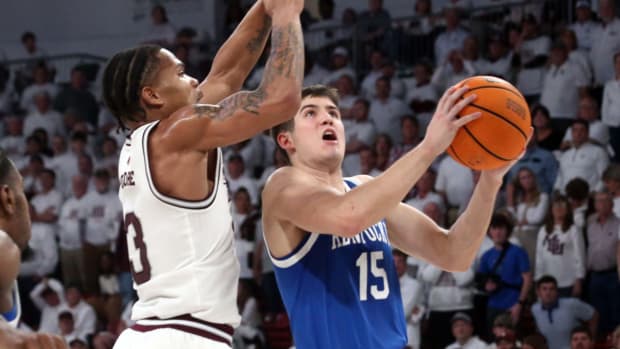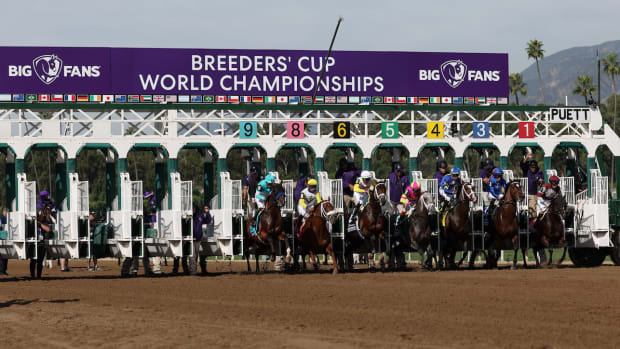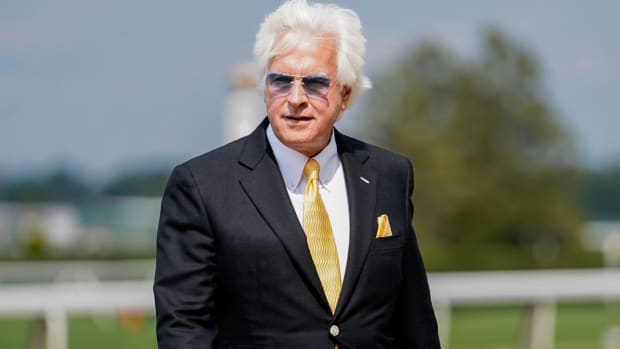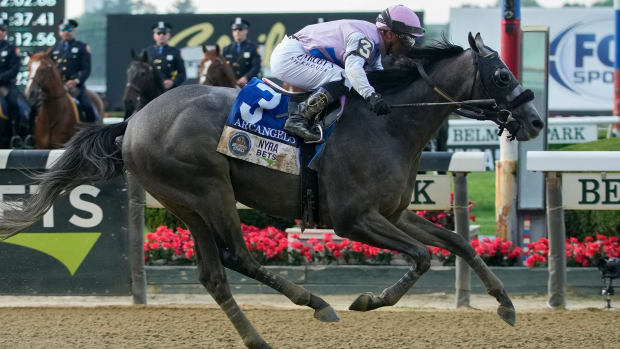American Pharoah's future comes into question after stunning defeat
SARATOGA SPRINGS, N.Y. — In the twilight of a late-summer Saturday, the Triple Crown winner stood outside his barn on a rubber pad beneath a high ceiling of oaks and elms, some nearly as old as the ancient racetrack itself, reaching toward a blue sky that was turning darker by the minute. His groom brushed bathwater from his flanks and flicked liquid off his mane. Puddles formed at his feet. A couple dozen fans leaned wearily against metal police barriers that had strained against adoring masses just a day earlier, but were now unnecessary, totems of greatness diminished for a day. It has been a racing season defined by living sound. The roar of giant crowds, ever louder, first in Kentucky and then in Maryland and New York at a Belmont Stakes for the ages and then at a coronation in New Jersey. Now, as American Pharoah stood motionless, a mother spoke to her small child in a whisper. Unseen birds chirped high in the leaves. A race call echoed in the distance. Here was the muffled sound of defeat, unfamiliar, unexpected and in the end, inescapable.
Keen Ice overcomes American Pharoah, wins Travers Stakes
On the first Saturday in June, American Pharoah had won the Belmont Stakes to become racing’s 12th Triple Crown winner and the first in 37 years, freeing the sport from a drought that came to relentlessly and painfully define it. On the day after that race his owner, Ahmed Zayat, vowed that he would continue to race Pharoah through the rest of 2015. “The sport needs stars,” he said. The sport needs stars, he implied, to run on racetracks, not to retire invisibly to breeding sheds, as they so often have done. In the ensuing weeks, Zayat would be alternately praised for his generosity (sharing his brilliant horse with fans) and criticized for his greed (milking bonus money from a stud deal made before Pharoah became great). Trainer Bob Baffert would be left (ostensibly) to decide when, where—and if—Pharoah would race. He would only run, Baffert said repeatedly, if he was right. “One bad day,” Baffert said as early as July and repeatedly afterward, “and I’ll retire him on the spot.”
Yet of course that one bad day would come. It always comes. It might have come in a morning gallop, a red flag against more racing, but more likely it would come in the harsh light of the afternoon, at the faster pace of racing and under the pressure of hungry opposing horses and—this is important—jockeys. It might come to a horse who had traveled across the country three times since early June. And when it came, there would be horses waiting to collect the rent.
• LAYDEN: American Pharoah’s legacy tested as career nears finish line
So it was for American Pharoah that the bad day came without warning Saturday at historic Saratoga, the beautiful and beloved racetrack in the foothills of the Adirondack Mountains in upstate New York, a place where racing is a six-day religion for six weeks every summer and where 50,000 fans (attendance was capped at that number) packed the grounds. It came in the 146th running of the Travers, for three-year-old colts, the so-called “Midsummer Derby,” and the centerpiece of the Saratoga meet. It came when Pharoah was ridden into exhaustion on the front end of a rugged pace, only to survive and find himself run down by Keen Ice, the come-from-behind grinder who had finished a distant second to Pharoah in the Haskell at Monmouth Park in New Jersey and third in the Belmont.
When it came it was met with the collective gasp that washes over the multitudes at a race track when tote board certainty (American Pharoah went off as the 2-to-5 favorite) is denied in reality. That gasp was followed by a moment of murmuring disbelief, backdropped by the distant cheers of punters who thrown down their cash on Keen Ice, a 16-to-1 shot who paid $34 to win.
American Pharoah dominates Haskell in return to racing, answers doubters
Moments after the finish Baffert stood inside the only glass-enclosed box on the grounds at Saratoga and said to no one at all (yet to everyone in earshot), “I can’t believe he got beat.” Zayat, meanwhile, made his way down an escalator from his private box above the finish line surrounded by his wife and four children, who have been a rollicking posse since Pharoah’s Kentucky Derby win on the first Saturday in May. “I was so confident,” Zayat said, staring straight ahead, clearly stunned. “Just so confident.”
Zayat then sat on the dais at a press conference just outside the Saratoga jockeys’ room and addressed the topic of Pharoah’s possible retirement without prompting. “I am a fan, I love this horse,” Zayat said. “…You have to ask yourself. Is the show over? Is it the time? My gut feeling [says], Time to go out on a high note. My gut feeling right now, without being outspoken, is to retire him.”
If Zayat goes through with this plan, Pharoah will retire with an exalted place in racing history, as just one of those 12 Triple Crown winners. It is an unassailable achievement that ensures a place in racing legend and in the memories of an entire generation that had seen nothing like it. Pharoah also has delivered one of the most dominant seasons in modern history, winning six consecutive races by more than 30 lengths despite seldom being asked to run in his highest gear. Yet undoubtedly horse racing experts will long debate his place among the giants of the sport. He has not defeated older horses or won when faced with significant obstacles. (He won the Kentucky Derby despite, as jockey Victor Espinoza said, being “empty after a half-mile,” but there were no significant tactical obstacles.)
(Also: It must be noted that Zayat’s quasi-retirement announcement might not be final. Zayat is famously emotional and was speaking Saturday after a difficult loss by a horse he loves. Dale Romans, who trains Keen Ice and has also worked for Zayat in the past, said, “Mr. Zayat is full of emotion right now. I really doubt he does retire him, I don’t think he wants to go out like that.” Team Zayat had said since the Belmont that its goal was to reach—and win—the Breeders’ Cup Classic on Oct. 31 at Keeneland Race Course in Lexington. It’s possible that Baffert and Zayat could find that American Pharoah recovers well from the Travers and continues on that path. It is also possible that Zayat makes good on Saturday’s proclamation. Zayat sold the breeding rights to Coolmore, an Irish-based breeding operation, last January, but retains ownership and decision-making through 2015. Zayat said Coolmore recently tried to buy out his incentives and retire Pharoah, who will be worth millions at stud, but Zayat said he turned down that offer. It could be put back on the table.)
However, on Sunday morning outside his temporary home in trainer John Terranova’s Saratoga barn, Baffert opened the door to racing Pharoah again. “Mr. Zayat is an emotional man,” Baffert said. “We were all really shocked. We didn’t expect the horse to get beat. We weren’t ready to give the losing speech. He looks great today. He could go back [to California], freshen up and run [again]. Sure.” To demonstrate Pharoah’s health, Baffert walked Pharoah in front of a small group of fans and let several children feed carrots to the horse.
When asked if the Breeders Cup remained in play, and that Pharoah could simply train up to that race with no prep race, Baffert said, “It’s possible. As long as nothing [negative] comes up between now and then. I’m happy with the way he looks today. He’s himself.” Baffert also reiterated that the final decision will be Zayat’s.
In the weeks since the Haskell, Baffert had resisted committing to the Travers, but Zayat had expressed a desire to run, because of Saratoga’s prestige (and possibly because of a significant financial kicker in the stud deal for winning the race). But Pharoah trained brilliant through August. “Pharoah made the decision,” Baffert said. Saratoga lavished him with love. More than 10,000 fans turned out for a Friday morning gallop.
Yet at Saratoga, the possibility of an upset always hangs in the air. The place is called “The Graveyard of Favorites,” largely because of two races that took place many years ago: Man O’War’s loss to Upset (hence the name) in 1919 and Triple Crown winner Gallant Fox’s loss to Jim Dandy in 1930. Secretariat also lost here to Onion two months after his Belmont (a race that haunted Baffert and made him fear a similar fate befalling American Pharoah), and 1982 Belmont winner Conquistador Cielo lost to a grey longshot named Runaway Groom in the Travers. It is a place where trainers and owners stay out long and late and sometimes races don’t go as planned.
American Pharoah, the Belmont and the making of a story for all time
On Saturday at 5:20 ET, American Pharoah entered the forested Saratoga paddock to the roar of fans lined up 10-deep along the white post-and-rail fencing that surrounds the area. Inside, fans hoisted smart phones into the air. A vague sense of panic built, as 1,000-pound animals moved in small circles. By herself on a patch of dirt, Jill Baffert, Bob’s wife, fought back tears, overcome by the emotion of the days, weeks and months. Perhaps a portend of what was to come.
Espinoza, who had ridden Pharoah throughout his eight-race winning streak, took him onto the Saratoga track nine minutes before post time. At first he felt fine—the Chingon powerhouse of so many previous races—but in the final minutes, that changed. “Just when I turned him around to take him back to the gate, he started to sweat,” said Espinoza. “Then it got really bad. I had to wipe the sweat of his mane with my whip. He’s never been like that before.”
Pharoah broke sharply from the number two post position and took an easy lead through quarter-mile splits in 24.28 seconds and 48.30 seconds, very similar to his dominant early splits in the Belmont. But on the backstretch, Frosted pulled alongside. Frosted, who had finished second in the Belmont Stakes, is normally ridden by Joel Rosario. But Rosario had been thrown from his mount two races before the Travers and taken to a hospital in Albany. He was replaced by Jose Lezcano. Rosario is patient. Lezcano is not. He ran to Pharoah’s throat and the pace quickened: the third quarter in 23.18 and the fourth in 23.60. “I didn’t make him go,” Lezcano said. “He took me there.”
American Pharoah's Triple Crown obliterates years of disappointment
Through the final turn, Frosted kept pressure on Pharoah, refusing to yield. In his box, Baffert sensed trouble. “You could see he didn’t have his ‘A’ game,” said Baffert. “Just the way Victor was riding him. It wasn’t the same Pharoah. He wasn’t doing it easily.”
Espinoza said that Lezcano pushed Frosted into Pharoah on the turn. “He put [Frosted’s] chest right on American Pharoah’s hip,” said Espinoza. “He hit me five or six times. I almost went into the rail. I understand that everybody in the race is trying to beat American Pharoah. I think he was trying to hurt American Pharoah. I don’t think Rosario would have ridden him like that.”
Lezcano denied crashing into Espinoza and Pharoah. “That never happened,” he said. “His horse was coming out.” (Head-on replays of the race are somewhat inconclusive. Frosted definitely moved in on Pharoah and the horses appeared to bump in the turn.) Even with all this, Pharoah shook loose from Frosted approaching the eighth pole. It appeared that he might not only win, but with the type of effort that would convince his critics of his toughness and strengthen his resume. But the rugged pace in the middle of the race and his battle on the turn with Frosted had taken too much out of Pharoah. The final quarter was run in a glacial 26.49 seconds (two seconds slower than Pharoah’s final quarter of the Belmont, a longer race), but still Keen Ice was able to win in the final jumps.
The page turns now. It leads to retirement, or it leads to redemption later in the fall. The aftershocks of Saturday’s defeats will ripple endlessly through the sport. Keepers of the game will rush to define its place in American Pharoah’s legacy, yet his place in history is secure. He won the Triple Crown and then he lost a race at Saratoga that he didn’t have to run. He made people care about racing and then he raced some more. “He doesn’t owe us anything,” said Baffert.
Hell, we owe him.





